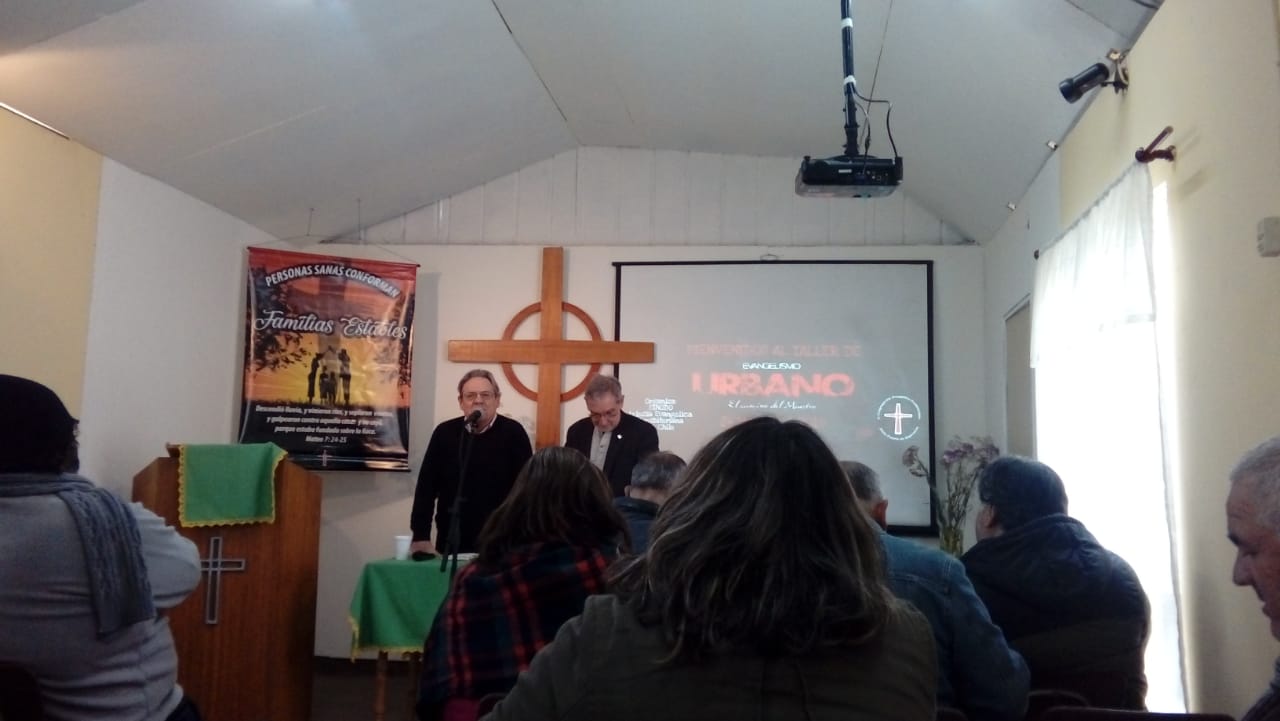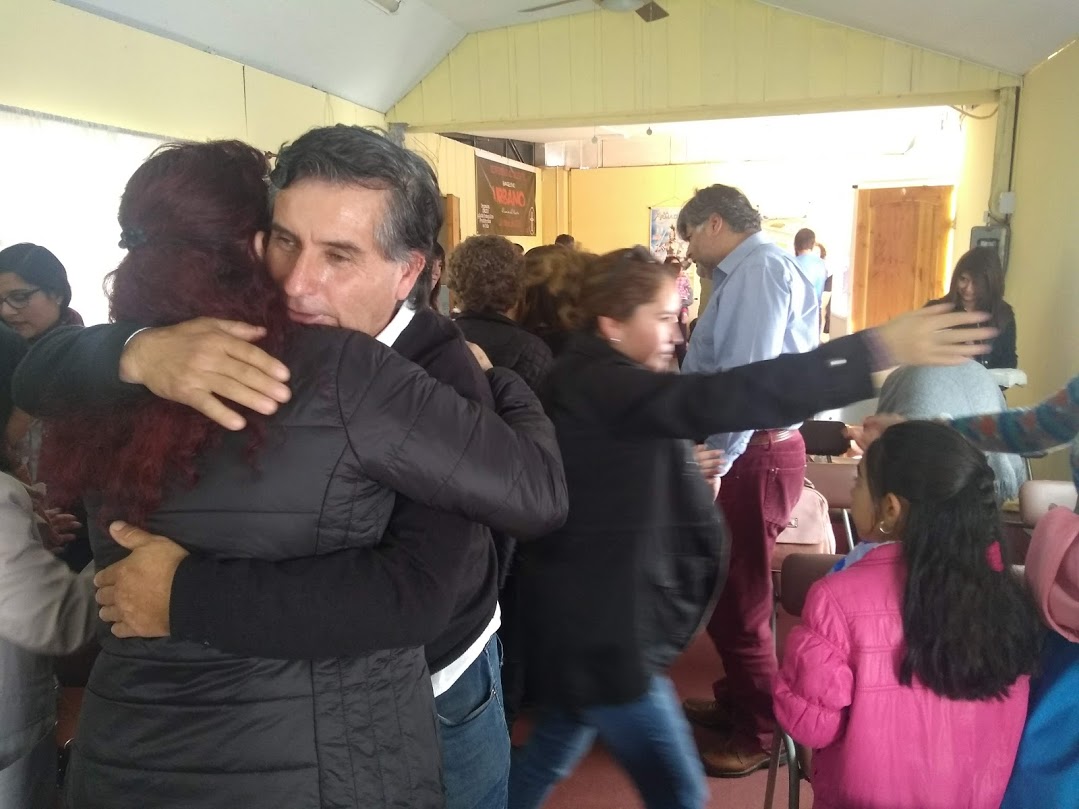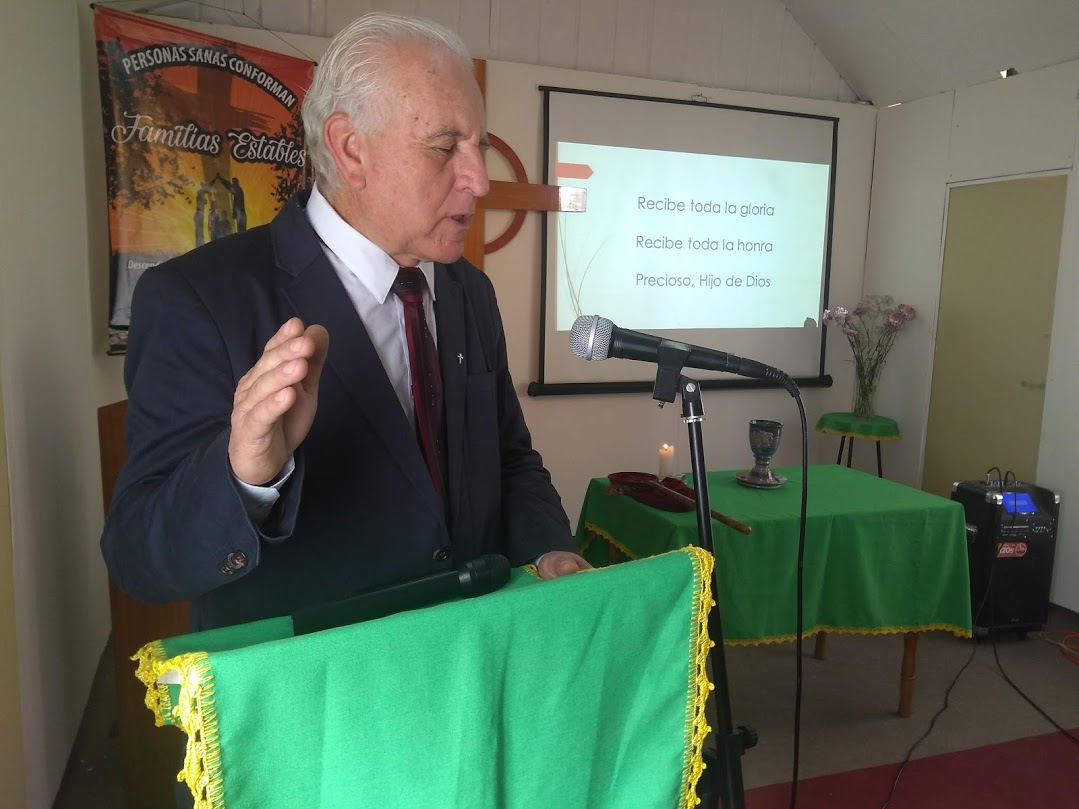A Letter from Dennis and Maribel Smith, based in Argentina, serving as regional liaison for South America
June 2018
Write to Dennis Smith
Write to Maribel Smith
Individuals: Give online to E200481 for Dennis and Maribel Smith’s sending and support
Congregations: Give to D503801 for Dennis and Maribel Smith’s sending and support
Churches are asked to send donations through your congregation’s normal receiving site (this is usually your presbytery)
Dear friends:
They are the “other” Presbyterian church in town; their name is Jesús, Fuente de Esperanza, (Jesus, Source of Hope). In their 20 years of ministry, never before had they been given the chance to host a Synod-wide event. Now, more than 40 people would be coming from all over the Evangelical Presbyterian Church in Chile (IEPeCh) — some traveling as far as 600 miles — for a one-day workshop on urban ministry!
You may recall that last year Rev. Dr. Bob Brashear from New York City and I spent a week with our Waldensian partners in Uruguay and Argentina for a series of workshops on urban ministry. This year we responded to similar invitations from ecumenical partners in Chile. We offered to explore with our partners how churches in South America can think about their contexts for ministry and can map out pastoral strategies for effectively living out the gospel in an increasingly urban world.
Would this small congregation be up to the challenge of hosting this event? They are strategically located in Vallenar, a prosperous mining town of 50,000 people in the Atacama region of northern Chile. Vallenar is the geographic center of IEPeCh churches in Chile, with the farthest churches being located 600 miles away, both to the north and south.
But I remembered that the last time I was here, six years ago, only about half a dozen older adults had attended worship. I wondered then whether this struggling congregation would survive.
During that previous visit, I learned that the congregation — in need of pastoral leadership — had selected Charles Escobar, one of their elders, to train for the ministry. Charles is a metallurgist who commutes each day from his home in Vallenar to his job at an iron ore processing plant in Huasco, about 30 miles away.
Six years had passed, and now, after a 9-hour bus ride from Santiago, Charles picked Bob and me up at the terminal and hosted us in his home.
As we shared a cup of tea, he and Gabriela, his wife, shared their testimony. Gabriela thanked God for a miraculous recovery from high-risk heart surgery. Tears ran down their cheeks as this devoted couple related how they understand their call to ministry as being a joyful response to God’s healing.
The next day, Saturday, a total of 43 of us studied, prayed, worshiped and broke bread together in Vallenar. We reflected together on how the Gospel of Jesus Christ transforms lives, had transformed our lives. That personal transformation people shared also transforms families and communities. Together we affirmed that — even in hard times — God is good, God is faithful, and God’s grace is sufficient. Always.
As we continued the conversation, Bob Brashear asked: “What do you as Presbyterians offer to Chilean society?” The group’s responses reflected the deep roots of the Reformed faith in Chile, a tradition that goes back to the 1860s. For this group, fruits of the Gospel in Chile have included the Presbyterian emphasis on education and on reaching decisions through a participative and democratic process. This has been no small contribution in a region where religion has sometimes promoted mindless obedience to autocrats and deepened bitter divisions in communities.
The elders and deacons at Jesus, Fuente de Esperanza received us with bountiful hospitality. This was not the group I had visited six years before! Now these officers of the church were proud to exhibit the fruit of God’s bounty to friends from far and near. They told of frequent fundraisers — how many empanadas and cakes must one sell to build a classroom? They showed the visitors how they were expanding their worship space and building a Sunday School wing, cement block by cement block, with their own hands.
The next day, Sunday, Charles invited me to preach. Thirty-five people were gathered that morning, including several young families. At prayer time, people shared their hurts and hopes — deeply felt. It was a fervent and free time — not without tears — but deeply respectful.
Before I began my sermon, I commented on how much had changed at Jesús, Fuente de Esperanza since my previous visit. I thanked them for their energy, their passion and for the previous day’s remarkable show of hospitality. God was at work in their midst, I assured them, and they were not alone.
I brought greetings from the small Reformed congregation where I often preach in Buenos Aires. I also brought greetings from sister churches in Venezuela, Colombia, Perú, Brazil and Uruguay. Their eyes lit up as I promised to share their story throughout the region and with you, the story of how they had set apart one of their own to be trained as their minister, how he and his family had accepted that call, and how they were building Christ’s church, person by person and block by block.
You, too, have been part of this story. By supporting Presbyterian World Mission, you are helping to train new pastors like Charles Escobar in Chile. At the request of the IEPeCh, Presbyterian World Mission provided a small grant to the Evangelical Theological Community, our partner seminary in Chile, to create an online training program for people like Charles. Thank you for being part of this exciting endeavor! And thank you for your continued, prayerful support for our ministry.
Under the Mercy,
Dennis A. Smith
![]() You may freely reuse and distribute this article in its entirety for non-commercial purposes in any medium. Please include author attribution, photography credits, and a link to the original article. This work is licensed under a Creative Commons Attribution-NonCommercial-NoDeratives 4.0 International License.
You may freely reuse and distribute this article in its entirety for non-commercial purposes in any medium. Please include author attribution, photography credits, and a link to the original article. This work is licensed under a Creative Commons Attribution-NonCommercial-NoDeratives 4.0 International License.


